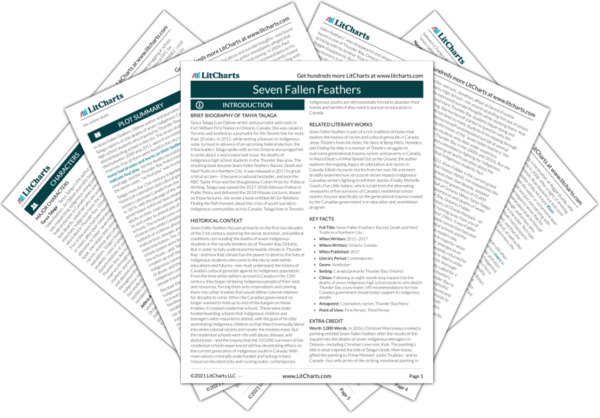Alvin Fiddler Quotes in Seven Fallen Feathers
Alvin thought about the abject poverty most of his people lived in and the addictions they suffered in the hopes of making all their misery go away.
Alvin thought about their parents, even his own older brothers and sisters, who had gone to residential school before his family moved to Muskrat Dam. And he thought about the forced schooling of more than 150,000 Indigenous kids and what it had done to the psyche of the people and the impact it had had on the next generation and the next.
And then he thought about the five dead students there in Thunder Bay. A direct line of causation could be drawn from the residential school legacy to the failings in the government-run education system his people were left with.

Unlock explanations and citation info for this and every other Seven Fallen Feathers quote.
Plus so much more...
Get LitCharts A+After the attack on Darryl Kakekayash, Alvin and Julian saw a clear and disturbing pattern. They could not help but wonder if First Nations kids were being targeted and murdered. It was extremely rare to hear of Indigenous kids drowning on their reserves. Most First Nations people were born and raised on the water. Equally perplexing was how quickly the Thunder Bay Police wrote off investigations into the deaths. For Jethro, Curran, Reggie, and Kyle, police had issued press releases that came to the same conclusion: foul play was not suspected. Each of the deaths was classified as accidental: death by drinking too much and then drowning. To Thunder Bay Police, no one was readily responsible for the deaths of the students.
The Canada Day holiday approaches and the country prepares to celebrate its 150th birthday on July 1; for Alvin it will be a day of reflection. He will be at a powwow […] with his family. He will be standing in a circle with all the nations surrounding him in ceremonial dance, and he will be thinking of the children before him decked out in their beautiful jingle dresses, their bright-coloured ribbons, and their feathers, and he will wonder about their future and what he can do to make sure they make it to the final prophecy—the eighth fire. Can the settlers and the Indigenous people come together as one and move forward in harmony?

Alvin Fiddler Quotes in Seven Fallen Feathers
Alvin thought about the abject poverty most of his people lived in and the addictions they suffered in the hopes of making all their misery go away.
Alvin thought about their parents, even his own older brothers and sisters, who had gone to residential school before his family moved to Muskrat Dam. And he thought about the forced schooling of more than 150,000 Indigenous kids and what it had done to the psyche of the people and the impact it had had on the next generation and the next.
And then he thought about the five dead students there in Thunder Bay. A direct line of causation could be drawn from the residential school legacy to the failings in the government-run education system his people were left with.

Unlock explanations and citation info for this and every other Seven Fallen Feathers quote.
Plus so much more...
Get LitCharts A+After the attack on Darryl Kakekayash, Alvin and Julian saw a clear and disturbing pattern. They could not help but wonder if First Nations kids were being targeted and murdered. It was extremely rare to hear of Indigenous kids drowning on their reserves. Most First Nations people were born and raised on the water. Equally perplexing was how quickly the Thunder Bay Police wrote off investigations into the deaths. For Jethro, Curran, Reggie, and Kyle, police had issued press releases that came to the same conclusion: foul play was not suspected. Each of the deaths was classified as accidental: death by drinking too much and then drowning. To Thunder Bay Police, no one was readily responsible for the deaths of the students.
The Canada Day holiday approaches and the country prepares to celebrate its 150th birthday on July 1; for Alvin it will be a day of reflection. He will be at a powwow […] with his family. He will be standing in a circle with all the nations surrounding him in ceremonial dance, and he will be thinking of the children before him decked out in their beautiful jingle dresses, their bright-coloured ribbons, and their feathers, and he will wonder about their future and what he can do to make sure they make it to the final prophecy—the eighth fire. Can the settlers and the Indigenous people come together as one and move forward in harmony?











